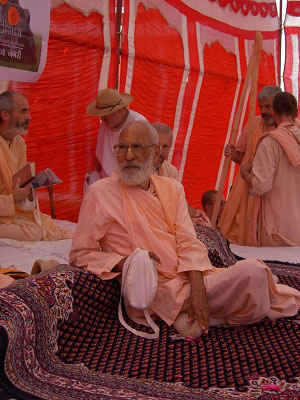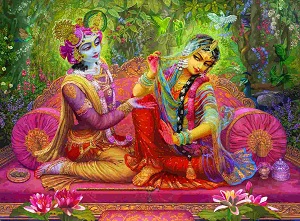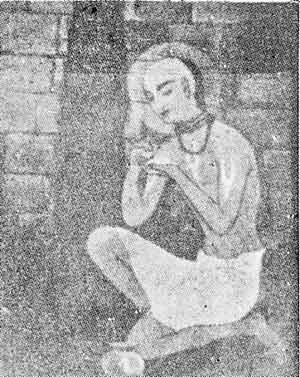Tridandisvami Sri Srimad Bhaktivedanta Narayana Gosvami Maharaja
The Goal, Vilap-kusumanjali Text 1
[As Srila Gurudeva, Sri Srimad Bhaktivedanta Narayana Gosvami Maharaja, is famous for his travelling throughout the world and preaching the message of Srimad-Bhagavatam and Sri Caitanya-caritamrta, so he is also famous for his unique ability to present the confidential topmost goal of life as well as the means to attain it.
In Vrndavana and Mathura, from 1990 to 1992, Srila Gurudeva was giving small classes on Srila Raghunatha dasa Gosvami's Sri Vilapa-kusumanjali, dasa Gosvami's heartfelt prayers for entering the excellent highest service attainable by the soul. Because the Harikatha team is working on publishing these lectures (hopefully) by Kartika of 2012, we are sharing with our readers Srila Gurudeva's classes on the first three verses. Below is Verse One, and in the next mailings you will receive Verse Two and Three.]
Verse 1
tvam rupa-manjari sakhi prathita pure'smin
pumsah parasya vadanam na hi pasyasiti
bimbadhare ksatam anagata-bhartrkaya
yat te vayadhayi kim u tac chuka-pungavena
tvam – you; rupa-manjari – Rupa Manjari; sakhi – my dear girlfriend; prathita – well known; pure – in the town; asmin – in; pumsah – man; parasya – of another; vadanam – the face; na – not; hi – surely; pasyasi – you look; iti – thus; bimba-adhare – on your lips, that look like red bimba fruits; ksatam – bites; anagata – not come; bhartrkaya – your husband; yat – which; te – you; vyadhayi – caused; kim – what? u – indeed; tac – that; chuka – parrot; pungavena – by the best of.
Translation
My dear friend Rupa-manjari! You are well known in Vraja for your chastity; you don't even look at the faces of other men. It is therefore surprising that although your husband is not at home, your lips, which are as beautiful as red bimba fruits, have been bitten. Has this perhaps been done by the best of parrots?
Commentary
Srila Raghunatha dasa Gosvami is first praying to his Gurudeva – not to Srila Yadunandana Acarya, nor to Srila Sanatana Gosvami or Srila Svarupa Damodara Gosvami. They are all gurus, and Svarupa Damodara is one of the best gurus. Still, Raghunatha dasa Gosvami first offers his prayers to Srila Rupa Gosvami, to whom he has dedicated his life and from whom he has received so much confidential guidance.
 Before writing Sri Vilapa-kusumanjali, Srila Raghunatha dasa Gosvami was thinking, "I should write a mangalacaranam, an auspicious invocation." As soon as he picked up his pen, he at once entered ardha-bahya-dasa (half internal, half external consciousness), and then antara-dasa (internal consciousness). In that inner state, in his form as Sri Rati-manjari, he saw the smiling face of Sri Rupa-manjari and noticed some unnatural marks – bite marks – on her lips. Rati-manjari also began to smile.
Before writing Sri Vilapa-kusumanjali, Srila Raghunatha dasa Gosvami was thinking, "I should write a mangalacaranam, an auspicious invocation." As soon as he picked up his pen, he at once entered ardha-bahya-dasa (half internal, half external consciousness), and then antara-dasa (internal consciousness). In that inner state, in his form as Sri Rati-manjari, he saw the smiling face of Sri Rupa-manjari and noticed some unnatural marks – bite marks – on her lips. Rati-manjari also began to smile.
Rati-manjari considers herself to be a new sakhi and Rupa-manjari to be her siksa-guru. Actually, there is no word 'siksa-guru' in that realm, but there is a transcendental conception of siksa-guru there. It can also be said that Sri Lalita-devi and Sri Visakha-devi are the siksa-gurus of all the sakhis. Because I am speaking in this mundane world, I am using the words of this world. I cannot explain these topics in transcendental language, so my words may sound mundane.
Intending to pray to Srila Rupa Gosvami, Srila Raghunatha dasa Gosvami entered deep into antara-dasa, internal trance, where he saw Rupa-manjari with some cuts on her lips. In a joking manner he said as Rati-manjari, "You are famous in Vraja as a chaste lady. However, although your husband has been gone four or five days and has not yet returned, I see that you have fresh cuts on your lips from a few hours ago, or maybe from last night. I think that perhaps a small parrot has come and mistaken them for a bimba fruit." Rupa-manjari then glanced towards Rati-manjari and, being very pleased with her, smiled still further.
Therefore, in the third verse it will be stated, "Tvam eva rati-manjari pracura punya-punjodaya – O Rati-manjari, you are the most fortunate gopi in Vraja." In that third verse, Sri Rupa-manjari has given a blessing. Although the third verse is in Srila Raghunatha dasa Gosvami's Vilapa-kusumanjali, these are not the words of Rati-manjari or Raghunatha dasa Gosvami, but rather the blessings of Rupa-manjari. Rupa-manjari has blessed Raghunatha dasa Gosvami: "You can write, and whatever you write will be the best composition."
In this world we have a guru and we are his disciples, but in raganuga-bhakti (internally) the guru is like a friend. Visrambhena gurau seva. In the spiritual realm, there is no formal relation of guru and disciple as there is in this world. Srila Raghunatha dasa Gosvami used to address Srila Rupa Gosvami as guru, and he respected him as such. Inwardly, however, he saw him as a sakhi, as Rupa-manjari, as he will further reveal in the third verse.
Throughout Vilapa-kusumanjali, he prays to Srimati Radhika, "All my prayers for service are like flowers. I am creating a garland of these flowers and, making them fragrant with the tears of my eyes, I am offering them to you."
He is telling this to Srimati Radhika, not to Krsna. All the verses of Vilapa-kusumanjali are in connection with both Radha and Krsna, yet he especially directs his heart to Radha. Rupa-manjari is very near and dear to Srimati Radhika, and therefore, to achieve Her mercy, he is praying herein to Rupa-manjari.
Note that it is not 'he' who is saying this, but 'she.' Rati-manjari is telling Rupa-manjari: "O Rupa-manjari sakhi, I have heard that you are famous in Vraja for your chastity to your husband. No one is equal to you. At the same time, I see something that I cannot understand, and I have a doubt. Your husband has gone to buy cows, and more than four or five days have passed. Because he is searching for a very special kind of cow, he has not yet returned.
"Still, I see a mark on your lips, which are as red as a very soft bimba fruit. That blackish parrot, who is always flitting and flying here and there, may have taken your lips to be a delicious bimba fruit. I think He wanted to taste that bimba fruit, and that must be why your lip is cut."
Before Raghunatha dasa Gosvami wrote this first verse, when he had been in antara-dasa in the mood of Rati-manjari, Rati-manjari had gone to see Rupa-manjari, who at that time was full of joy. Perhaps they had met shortly after rasa-lila.
The inner meaning of Rati-manjari's statement is: "I see today that Krsna has met with you, and therefore your lips are cut. Can you describe what happened?" At once, Rupa-manjari took Rati-manjari in her arms and began to weep. She was not able to answer directly, but with her eyes and mood she said, "Yes, Krsna has done this."
It may be said that Rati-manjari is offering pranama, obeisances, by this utterance, but the word 'pranama' is not in the verse. Her mood and prayer is so much greater than a pranama; and, hearing her poetic words, Rupa-manjari at once became so glad.
In the next verse Srila Raghunatha dasa Gosvami prays:
sthala-kamalini yuktam garvita kanane'smin
pranayasi vara-hasyam puspa-guccha-cchalena
api nikhila-latas tah saurabhaktah sa muncan
mrgayati tava margam krsna-bhrngo yad adya
"O Sthala-kamalini!" Kamalini means 'lotus,' and sthala-kamalini means 'land-lotus.' The kamala blooms in sunlight, and the kamalini blooms at night, by candra-prakasa (the light of the moon). The word candra in this connection refers to Krsnacandra.
"You are laughing. Why are you laughing? Is there anything behind this? I think that in this moonlit Vrndavana forest You have fully blossomed; softness, fragrance, and honey are all abounding in you. You laugh because You are quite proud. Ladies are greatly proud when their husbands are obedient to them and try to please them at any cost. You are proud because you understand that all other gopis are nothing in comparison to you. You laugh as if You are puspa-guccha-cchalena, several lotuses in one cluster." Here the word guccha, cluster of flowers, implies that Srimati Radhika is resplendent with laughter, glances, and so on. And, because Rupa-manjari vicariously experiences what Radhika experiences, she also manifests these symptoms.
Rati-manjari continues, "The bee loves flowers. In this Vrndavana there are so many flowers, each more beautiful than the other. You are the most fragrant, however. Therefore, not flying here and there, that bee, that black Krsna-bee, has left all other lotus flower-like gopis and came only to you. You have bound Him by Your fragrance, Your beauty, Your sweetness, and all Your other qualities. Will You have mercy upon me so that I can realize and taste all that You taste? Please give me a little of Your mercy."
Question: You once said that when Krsna approaches Rupa-manjari she says, "Radhe! Radhe!" and runs away. You have said that she has no desire to meet personally with Krsna. Her only interest is to be with and serve Srimati Radhika.
Srila Gurudeva: This is implied in the verse. Sri Rupa-manjari is a sevika, a maidservant, of Srimati Radhika. When Srimati Radhika sends a sakhi like her to Sri Krsna as a messenger, Krsna may propose to her in all kinds of ways – but she always refuses His advances. Srimati Radhika has full faith in these sakhis, because they act in such a way that She has no chance to doubt them.
This type of kamatmika-prema, or kamarupa ragatmika-prema, is not sambhoga-icchamayi (entailing direct enjoyment with Krsna); it is tat-tad-bhava-icchamayi (enjoying via the enjoyment of Srimati Radhika), and it has a speciality. If the manjaris do not have kama, they cannot be kamanuga. They have kama, but it is in the anugatya (under the guidance) of Radhika. It is not independent of Her. By Radhika's wish Krsna sometimes approaches the manjaris, for without this they cannot be considered in the category of kamanuga, but they reject His advances.
The manjaris are like the small flowers of a creeper. If one pours water on the root of a creeper, all the flowers and all the leaves will be nourished. Similarly, when Radha and Krsna meet, whatever Radha is experiencing – by Her mouth, face, and body – is experienced by them. Whatever She experiences by tasting Krsna, they also experience.
Have you heard this verse?
sri-rupa-manjari-kararcita-pada-padma-
gosthendra-nandana-bhujarpita-mastakayah
ha modatah kanaka-gauri padaravinda-
samvahanani sanakais tava kim karisye
(Sri Vilapa-kusumanjali, text 72)
O golden-complexioned girl, when You are laying with Your head in Krsna's lap and Your feet are in the lap of Rupa-manjari, and she is massaging Your feet, will Rupa-manjari, with the corners of her eyes, offer me her mahaprasadam seva of gently massaging Your feet while she fans You?
Not only this verse, but all the verses of Sri Vilapa-kusumanjali confirm the idea that the only desire of the manjaris is to serve Srimati Radhika in Her service to Sri Krsna. All rupanuga Gauòiya Vaisnavas remember these verses and utter them daily.
This service is our final goal. If you somehow have greed for this service after hundreds of thousands of births, you will be so fortunate. The qualification for this will come by the grace of a gopi who is manifest in this world as a raganuga Vaisnava, and when you achieve his grace it will be very easy to remember all these prayers and pastimes. In your present stage it is not easy to remember, but at that time remembrance will come easily and automatically, without any endeavor.
Question: You have said previously that by Srimati Radhika's arrangement or indication Lord Krsna meets with some other gopis or manjaris. At the time of rasa-lila Krsna dances with all of the gopis. Is that also Radhika's desire or arrangement?
Srila Gurudeva: This is an example of nara-lila. Her desire was there, but it was not shown outwardly. Inwardly She wanted it, but if She had revealed Her inner desire She would not have left the rasa arena, the other gopis would not have come to understand Her superiority, and there would not have been rasa.
There are many types of rasa-lilas. Vasanta-rasa was seen in trance by Srila Jayadeva Gosvami, and he has written about this in his Sri Gita-govinda: Once, rasa was going on at Candra Sarovara, near Govardhana, for the period of Brahma-ratri, Lord Brahma's night. During that time Candra (the Moon) stayed fixed in one place, watching everything, and that place is therefore called Candra Sarovara. During that rasa-lila Srimati Radhika thought, "Krsna is sporting with all the gopis as well as with Me. He is neglecting Me." Seeing Him with all the other gopis, She disappeared from the arena of the rasa and entered a kunja.
The author of Gita-govinda has written, "Smarati mano me krta parihasam." When Srimati Radhika was greatly suffering in deep viraha-rasa (separation), continually weeping for Krsna, a sakhi – either Lalita, Visakha, or Rupa-manjari – approached Her. Radhika was weeping so bitterly that She was barely able to maintain Her external consciousness. When the sakhi asked, "Why are You weeping?" Srimati Radhika replied, "Smarati mano me krta parihasam – My heart remembers only the joking pastimes that Sri Krsna enjoyed with Me."
How does Krsna joke? He thinks, "Srimati Radhika should become angry with Me. Then, when Her anger is gone and She is pleased, I will have a greater chance to serve Her."
Srimati Radhika told Her sakhi that once, when Sri Krsna was once sitting with Her after rasa, He said to Her, "O Priye (darling beloved), O Candra, I am so pleased with You." He had said 'Candra,' indicating Candravali, knowing She was Radhika, just to make Her angry. He continued, "O Priye, I am Yours. I do not belong to anyone else, O Priye Candra." Hearing this, Srimati Radhika became furious and said, "Never speak to Me again. I will have no connection with You. Go to Candra at once, and remain with her. Don't come to Me at any time." Krsna then prayed to Her, "Please excuse My offence. I have committed a great mistake. I promise that I will never do this again." He had done that only in jest, but still He 'admitted' His fault and prayed, "Please forgive Me." His hands were cupped like those of a beggar, and His pitambara (yellow cloth) was hanging from His neck.
After sharing this with Her sakhi, Radhika was restless and could no longer speak; She could only think of Krsna.
Another time, Krsna sent a gopi to Radhika, telling her, "Go and tell Radhika that I am praying to Her. Tell Her that I will never commit an offence again in My entire life, and that She must forgive Me." However, hearing Krsna's message and simply weeping, Srimati Radhika told the messenger, "I will not do so." When that gopi returned to Krsna and repeated Radhika's words, Krsna exclaimed that again a duti (messenger) should go to appease Radhika, and this time He Himself became the messenger in the dress of a very beautiful gopi. He was decorated with sixteen kinds of abharana (decoration) and thirty-two kinds of bhavas (ecstatic ornamentations), and His many bhavas made Him look exquisite. Decorated with various colored unguents, He approached Radhika and bowed down before Her.
At first Radhika could not recognize Him. She simply saw a very beautiful gopi, and asked 'Her,' "Who are You?"
Sri Krsna replied, "Krsna has sent Me to You. I am a dasi of Krsna, and He has sent Me to beg You to forgive Him. He has made a mistake; He admits that. So, please do not be angry with Him. He is certainly faultless, and He is unable to commit any offence. He is very rasika, and He loves You more than any other gopi. Now He weeps continually, and upon hearing and seeing His weeping all the creepers, trees, and other beings are also weeping. You alone are not affected."
Hearing this, Radhika's heart melted and She said, "Sakhi, what shall I give You? I wanted Him to admit His fault and come to Me, so I'm very much pleased with You." She took that sakhi in Her arms, and when She did so She at once understood, "Oh, this is Syamasundara!"
 Srila Jayadeva Gosvami explains in Sri Gita-govinda that when Srimati Radhika left the rasa-lila and entered the kunja, Krsna came and placed His head at Her lotus feet. He prayed to Her, "Smara-garala-khandanam mama sirasi mandanam, dehi pada-palavam udharam – Your lotus feet are like a vast reservoir of water that can extinguish a great fire. I am burning in the fire of separation from You." Garala means poison, and smara means kama, or love. "I am burning in separation with a desire to meet with You. Now I have caught hold of Your lotus feet; only these feet can relieve Me of that fire. Dehi pada-palavam udharam. Now I offer My head at Your lotus feet. Please decorate My head with those feet."
Srila Jayadeva Gosvami explains in Sri Gita-govinda that when Srimati Radhika left the rasa-lila and entered the kunja, Krsna came and placed His head at Her lotus feet. He prayed to Her, "Smara-garala-khandanam mama sirasi mandanam, dehi pada-palavam udharam – Your lotus feet are like a vast reservoir of water that can extinguish a great fire. I am burning in the fire of separation from You." Garala means poison, and smara means kama, or love. "I am burning in separation with a desire to meet with You. Now I have caught hold of Your lotus feet; only these feet can relieve Me of that fire. Dehi pada-palavam udharam. Now I offer My head at Your lotus feet. Please decorate My head with those feet."
Srimati Radhika became happy and said, "Yes, I am ready to go to the rasa-sthali (the arena of rasa-lila); but please do one thing: My hair and braid have become disarrayed, so please fix them." Sri Krsna then very happily began to comb Her hair. Srimati Radhika held up a mirror in front of Her to see Sri Krsna's face – how joyfully He was serving Her. Then She said, "Now, please place ornaments on My body and ankle-bells on My feet," and Krsna did that.
This is called svadhina-bhartrka, wherein Sri Krsna is fully under the control of His beloved. Convinced now that He wants Her more than any other gopi, Srimati Radhika accompanied Him to the rasa-sthali.
This pastime took place during Vasanta-rasa, and it shows that Srimati Radhika inwardly likes to arrange for Krsna to meet with other gopis, but outwardly, for rasa, Her mood manifests differently.
Sri Krsna also acts in this way. Once, Radha and Krsna and all the gopis were meeting together in Vrndavana, and at that time Srimati Radhika became angry. Sri Krsna wanted to talk to Her, but She was not in a mood to talk. Krsna then became very unhappy and said, "If You refuse speak to Me, I'm going." He then entered a nearby kunja and pretended to be asleep.
A sakhi or manjari who was watching from a distance saw Him enter there, and, returning to Lalita and Visakha, she told them, "Let us go and see what He is doing there." Lalita, Visakha, and Srimati Radhika went to that place and saw Him 'sleeping,' whereas He was thinking, "Let them think I am in a good, sound sleep."
Lalita told the others, "This is the best time to steal His flute. When we take it, He will become Srimati Radhika's most obedient servant. Though we need to capture it, we must also be aware that Krsna's arms are like very cruel serpents. If He catches us, how will we accomplish our theft?" They proposed that this difficult task could only be performed by Srimati Radhika – not by anyone else. She would go and somehow steal that flute.
Silently and stealthily approaching like a cat, and with a slight smile, Srimati Radhika glanced towards Krsna to make sure He was unaware of Her presence. In the meantime, Krsna had been hearing the gopis' conversation. Inwardly desiring that they steal His flute, He was thinking, "Srimati Radhika has not been talking to Me. If She steals My flute, I will have an opportunity to meet Her and speak about so many things in so many ways. I will do something by force. I will demand, 'Where have You kept My flute?' I will catch hold of Her, and one, two, three, or four others, and this will create a very good rasa." Outwardly, however, He remained silent.
Srimati Radhika watched to see whether He was actually sleeping or only pretending to sleep. At first He held His flute tightly, but because He knew that Radhika was coming He loosened His grip. Radhika very cleverly and silently took the flute and returned to Her friends. She then gave the flute to a sakhi, who gave it another, who in turn gave it to another; and finally She hid it in Her long braid.
After some time the gopis heard the leaves rustling, and then they saw Krsna come out of the kunja. He asked them, "Oh, you are here? Where is My flute? You have taken My flute!" As He walked up to Srimati Radhika, with Her eyes She told Him that Lalita had taken it. When He went to Lalita and demanded, "Where is My flute? You have taken it!" She told Him that it had been taken by Visakha. He then went to Visakha.
In this way Sri Krsna continued searching, and He continued to ask the gopis, "Where have you put My flute?" The gopis ran hither and thither, laughing and clapping "O, Your only wife is Your flute," they said. "Now she has gone, but don't worry. We will go and cut a piece of bamboo. There are so many bamboos here. Why are You crying for that one?" In this way they teased Krsna, and He replied, "Oh, you don't know that this flute is My very life."
At last, Kundalata-devi arrived on the scene. She is the wife of Subhadra, Upananda's youngest son. Upananda is the brother of Nanda Baba, and is thus Krsna's uncle. In India, the son of one's uncle is considered like a brother, and he is also called 'cousin-brother.' Subhadra, Krsna's cousin, is older than Him, and Kundalata is therefore Krsna's elder sister-in law.
Kundalata asked Krsna, "Why are You so distressed?" Krsna replied, "My flute has been stolen by these gopis, and they will not return it. They simply tell Me, 'Go and take shelter of the feet of Lalita, or Visakha.'" Kundalata then told the gopis, "Don't behave like this. Give Him back His flute. If you do, He will fulfill all your desires."
There are so many pastimes like this. Krsna sometimes pretends to sleep, but He knows everything; for lila He does so. And, as far as Srimati Radhika is concerned, She is para-sakti (Krsna's complete, spiritual potency), or svarupa-sakti (Krsna's intrinsic potency); She also knows everything. Whatever She does is only to please Krsna, and Krsna does everything only to please Radhika and all the gopis. This is also true in rasa-lila. Krsna wanted to please Her, and She wanted to please Him.
Do not have any worldly conception about this. Always be cautious to avoid even a trace of material conception. Pray to Yogamaya, Sri Krsna, Srimati Radhika, and all the sakhis that no worldly idea will come in your heart by hearing and reading these lilas.
vikriditam vraja-vadhubhir idam ca visnoh
sraddhanvito 'nusrnuyad atha varnayed yah
bhaktim param bhagavati pratilabhya kamam
hrd-rogam asv apahinoty acirena dhirah
(Srimad-Bhagavatam 10.33.39)
"If anyone deeply hears, tells, reads, or remembers the pastimes of rasa with great faith, all worldly lust will disappear from his heart at once."
Sri Pradyumna Misra once told Sriman Mahaprabhu, "I want to hear some hari-katha."
Mahaprabhu replied, "I don't know any hari-katha, but I have heard hari-katha from Sri Ramananda Raya."
Pradyumna Misra then went to Ramananda Raya's home. Seeing that he was not in the outer courtyard, he asked the servant, "Where is he?"
The servant replied, "He is in the inner quarters, in his room."
Pradyumna Misra asked, "What is he doing? Will he come out now?"
The servant replied, "No, he will not come out. If you like you can come at any other time."
Pradyumna Misra then asked, "What is he doing?"
The servant replied, "He is with young teenage girls, they are deva-dasis, or maidservants of Lord Jagannatha. He is washing, dressing, and decorating these maidservants, and teaching them how to dance and sing for the pleasure of Lord Jagannatha."
Pradyumna Misra thought, "He is dressing teenage girls? I am a brahmacari. There is no need of hearing hari-katha from that person. I want to hear from someone like Srila Sukadeva Gosvami."
Pradyumna Misra returned to Mahaprabhu with some disdain. Mahaprabhu asked him, "Have you heard anything from Ramananda Raya?"
"No."
"Why not?"
Pradyumna Misra was silent. Mahaprabhu knew that he had a sense of disrespect towards Sri Raya Ramananda, and therefore told him, "While seeing these girls, Ramananda Raya is like a tree; like dry wood. No transformation of lust takes place in his body. What to say of these girls, even if a demigoddess would come to him, there would be no reaction at all in his body or mind. He is always remembering rasa-lila, and it is he who told Me rasa-lila katha. First he explained varnasrama-dharma, and I told him, 'This is external. Please explain further.' At last he told Me that kanta-prema, madhurya-prema, is the greatest perfection of life. He told Me it is also greater than sakhya-rasa and vatsalya-rasa, and he explained two verses in this regard.
"One verse describes how Sri Krsna appeared before the gopis as saksan manmatha-manmathah, the enchanter of Cupid:
tasam avirabhuc chaurih
smayamana-mukhambujah
pitambara-dharah sragvi
saksan manmatha-manmathah
Srimad-Bhagavatam (10.32.2)
Then Sri Krsna, a smile on His lotus face, appeared before the gopis. Wearing a garland and a yellow garment, He directly appeared as one who can bewilder the mind of Cupid, who himself bewilders the minds of ordinary people.
"After singing Gopi-gita, the gopis were reunited with Sri Krsna, who had been observing them bitterly crying in separation as they sang. Sri Sukadeva Gosvami explains that Krsna appeared before the gopis when they were senseless and just about to die. In what manner did He come? Smayamana-mukhambujah. Smaya means prema, or love. He came with so much love. Mukhambujah – mukha means 'face,' and ambuja means 'lotus.' His beautiful face resembles a lotus flower. He was smiling, but He also looked somewhat ashamed. Why? He was thinking, 'I have given the gopis so much suffering.' Pitambara-dharah. He placed His pitambara, or yellow cloth, around His neck, and His palms were folded in supplication in a mood of prayer, yet He was also smiling. Manmatha-manmathah. Manmatha means 'one who can enchant others' minds and hearts by the sweetness of His form and qualities.'
"Bhagavan Sri Krsna is so beautiful, and He enchants even Madana, Kamadeva (Cupid), who Sankara once burnt to ashes for trying to make Sankara lusty. Kamadeva was reborn as Pradyumna, the son of Sri Krsna, who is manmatha-manmathah, the origin and enchanter of Kamadeva.
"Now, in the presence of the gopis, Krsna became extremely beautiful, with a smiling face and with some shame, as if He committed an offence. He was now bowing down to them.
"These gopis placed their silken veils on the earth to seat Him, and sitting on that seat Lord Krsna appeared lovely. At that time He told them:
na paraye 'ham niravadya-samyujam
sva-sadhu-krtyam vibudhayusapi vah
ya mabhajan durjara-geha-srnkhalah
samvrscya tad vah pratiyatu sadhuna
Srimad-Bhagavatam (10.32.22)
I am not able to repay My debt for your spotless service, even within a lifetime of Brahma. Your connection with Me is beyond reproach. You have worshiped Me, cutting off all domestic ties which are difficult to break. Therefore please let your own glorious deeds be your compensation.
"'I have disappeared from your sight only to hear your words of loving anger and to see your faces in anger. I did this to increase your love for Me, and to show the whole world Srimati Radhika's unparalleled condition in separation from Me; so that the world would realize Her glory. I did not go anywhere. I was here, but I was hidden.
"'If I take birth as Lord Brahma, who has the longest life-span in this entire universe, or even if I have the combined duration of the lives of billions of Lord Brahmas, I will never be freed from My debt to you.'
"The gopis asked, 'Why is that?'
"Krsna replied, 'Because you have left your husbands and everything else to come to Me. I am indebted to you. And if I tell you to ask from Me anything you like, you will say, "Give us the opportunity to serve You."
Thus, I will become still more indebted. If again I tell you to take any blessing from Me, again you will say, "Allow us to serve You." In this way I will never be free from My debt to you.'"
Sri Caitanya Mahaprabhu continued, "Srila Ramananda Raya knows all these truths, and he has induced Me hear them. So go again. Be assured that he is like a piece of dry wood in relation to this world. He has no material identification. He is like Srimati Radhika and the gopis, who have no desire in their heart to please themselves:
atmendriya-priti-vancha – tare bali 'kama'
krsnendriya-priti-iccha dhare 'prema' nama
(Caitanya-caritamrta, Adi-lila, 4.165)
Kama is the desire to please one's senses, and priti, love, is the desire to please Krsna."
Sri Pradyumna Misra went again, and this time Raya Ramananda was in his courtyard.
Raya Ramananda asked, "Why have you come here?"
Pradyumna Misra replied, "I requested Sri Caitanya Mahaprabhu to tell me some hari-katha, and He replied, 'I don't know anything. Sri Ramananda Raya knows everything.'"
Ramananda Raya asked, "What kind of hari-katha do you want to hear?"
Pradyumna Misra replied, "I want to hear what you told Caitanya Mahaprabhu – all those topics."
Srila Ramananda Raya narrated that hari-katha, and Pradyumna Misra became deeply satisfied. He returned to Sri Caitanya Mahaprabhu and told Him, "I feel fulfilled, by Your grace."
The gopis can give what Krsna cannot give. Similarly, Srila Ramananda Raya and Srila Rupa Gosvami can give the love of the gopis, and Lalita and Visakha can give it, but Krsna cannot.
Clearly pleased, Mahaprabhu told Pradyumna Misra, "It is said that I am rasika, the knower and taster of all rasas. But how has this become so?" He gave the credit to Srila Ramananda Raya, who is likened to a rain-cloud which takes water from the ocean. When, during the svati-naksatra constellation rains pour down upon the ocean, the oysters within it produce pearls. That very water from the ocean becomes clouds by evaporation, and during the svati-naksatra the water returns to that ocean. But at that time the ocean becomes filled with jewels.
Similarly Sri Krsna, or Sri Krsna as Sri Caitanya Mahaprabhu, is rasika, but He is not rasika independently. Just as Mahaprabhu hears about or remembers Srimati Radhika and the gopis with the help of Srila Ramananda Raya, similarly, when Sri Krsna sports with Srimati Radhika and the gopis and they converse with Him, then He is rasika. Otherwise He is nirvisesa-tattva (the featureless, impersonal aspect of the Absolute).
sancarya ramabhidha-bhakta-meghe
sva bhakti-siddhanta-cayamrtani
gaurabdhir etair amuna vitirnais
taj-jnatva-ratnalayatam prayati
Sri Caitanya-caritamrta (Madhya 8.1)
Sri Gauranga Mahaprabhu is a boundless, nectarean ocean of the established conclusions of devotion (bhakti-siddhanta), and His devotee Sri Ramananda Raya is the cloud whom He filled with these conclusions about devotion to Him. When Mahaprabhu experienced the rain of bhakti-tattvas that the Ramananda-cloud showered upon Him, He was transformed into an ocean of jewels.
* * * * *









